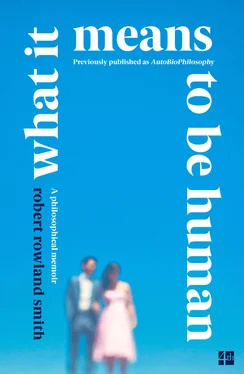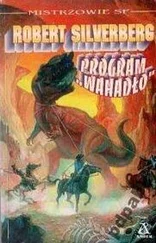I saw first hand just how much my father’s character shaped his fate. Despite his education, his money, his family, and his luck in being given both a job and a house, he experienced life as a series of calamities. The slightest thing would vex him. If the traffic was bad, if he couldn’t open a jar, if a utility bill arrived in the post, if the sink got blocked, if the lawnmower ran out of petrol, if the television picture went fuzzy – in all cases, an almost existential despair would wash over him. It was as if every red light on the road was a monstrous unfairness trained deliberately on him. In little things he saw large tragedies. Fate had seen that Colin’s character was tragic, and decided to follow suit.
What overwhelmed him, I believe, was the sense of confronting his own resourcelessness. It wasn’t just that he had been given a lot, but that both boarding school and the family business were institutions that ran life for him. True, he had shown initiative in bringing Patricia to Canada. But she was expected to be a stereotypical 1950s wife, managing his domestic infrastructure. In other words, he’d had precious few opportunities to develop agency of his own. So whenever something less than advantageous occurred, he looked into his cupboard of personal supplies for dealing with it, and saw that it was empty.
In such tiny moments, Colin exhibited a brief but bottomless despair. He would let out what the English Gothic writer Thomas de Quincey called a ‘suspiria de profundis’, a sigh from the depths. I remember this sigh filling the house like the exhalation of a wounded animal. So when something truly terrible finally did happen – his own father ousting him from what was purportedly a family business – one can only imagine the hollowness into which he stared. If it was hard enough for Colin to roll with the mishaps of everyday existence, how frightening it would have been to behold this once-in-a-lifetime tsunami.
In the jargon, Colin lacked the necessary ‘coping mechanisms’. The want of resilience that he had shown in allowing minor inconveniences to flummox him became, when he was fired, his condition of being. Cruelly, it also provided the ideal environment for the MS to thrust upwards from beneath the ground, where it was only half buried, into the light. For whatever else multiple sclerosis might be, it is a disease that deprives its victims of the ability to cope. To someone whose coping mechanisms are already feeble, an incurable disease such as MS, mixed with unemployment, produces a fatal concoction. Paralysis was the result.
Other people might have responded differently. Stories abound of those who conquer or at least subdue their MS through a combination of attitude, diet and exercise. But my father responded in the way that only he could. He met the emptiness that faced him with an emptiness of his own. That was his character, and it became his fate.
Our parents are foreigners in time
Both character and fate set Colin apart. They even set him apart from me, his biological offspring. The straight genetic pipe from him to me contained leaks, so not everything got transmitted. Besides, there was another pipe coming in from the maternal side, although with leaks of its own, to be sure. It is by these twin leaky conduits that we’re connected to our biological inheritance.
What that means in terms of our parents is that we’re both the same and different. Such is the mystery of generation. When the human organism divides, it issues a copy of itself that’s not quite perfect. The uncanny thing is to look into the face of anyone we know and see three people. Both parents flutter in the movements of that face, along with the unique combination of them that produces the third person, the person whom we erroneously think of as a discrete self.
That leakiness is not just biological. It also applies to what gets transmitted by way of narrative about our parents’ lives. We hear a few details and they take on a magical quality, like photographs found in an attic. But so much of their lives leaks away, and we have to rely on their memories, which are leaky themselves. These memories can feel strange because they are both near and far. They are highly intimate and yet unavailable. They have a warm otherness to them, like a soil.
That soil is where we come to be planted. It is because they concern our own origin that our parents’ stories, about their lives before us, take on the quality of fable. Origins are always mysterious. We hear this mystery in Colin’s narrative. We get a picture of the 1950s, for example. It contains a post-war mixture of bereavement and hope; the recognition of a modernity finally burying the Victorian past; and a sense that the triple-towered edifice of class, gender and religion is cracking. But that is a historical view. Through it, the 1950s seem to be part of an objective account that people can write books or make documentaries about. This account is available to anyone who’s interested. The other is the view of a child – me – learning about the time in which my parents lived, before the child was born. This view is far more private, and the time period it gazes at has a different feel. Different and more enigmatic.
The stories about our parents aren’t quite history, therefore, even where there is plenty of historical data, because they produce in us a state of wonder. This wonder makes those parents all the stranger to us. Indeed, as much as those stories draw us in to the lives of father and mother, we can’t help feeling a trace of repugnance. For all our natural, biological proximity to them, they are foreigners in time. Children come after their parents, by necessity, and we all live in a flow of time that none of us can interrupt. Time is like a motor beneath an hermetically sealed bonnet, always running.
So if our parents are strangely ‘other’ to us, their children – if their fate separates them from us, their closest kin – it’s not just because the stories are exclusively theirs. It is also because those stories hail from a time that is not ours. Our parents are not of our generation, and so a quantum of alienation runs beneath every experience that we have of them. Even these twin origins of our becoming, our parents, remain other to us. In this respect, they are no more special than every other person on the earth – even the remotest, the never thought-of, those who come and go without us even having been aware of their existence.
Perhaps this semi-disconnect from the past of our parents is why our own lives can at times feel so random. In Existentialist philosophy, which examines the big questions of life and death, insisting on the arbitrariness of our birth is a commonplace. Martin Heidegger, for example, writing in the hush of the Black Forest in the 1920s, talks about how we are ‘thrown’ into the world. It is as if we were literally cast into a pine forest, fenced in by the tall, dark shapes of the trees and the silhouettes of strangers threading between them. There’s nothing apparently necessary about how we got there. Whenever we get an intimation that, thanks to the separating effects of time and fate, some distancing even from our own parents is inevitable, it’s little surprise that this sense of randomness can seize us so strongly.
Performance versus belonging
Colin himself would hardly have been unaware of all the factors that created distance between him and the members of his family. First, there was the divorce of his parents. Though divorce wasn’t unheard of at the time, it was scarcely the norm. Another half-century would have to pass before its stigma faded.
Second, there was being sent to boarding school. Again, this wasn’t uncommon. It was even considered a reputable form of education for a boy – ‘character-building’ was the term used to endorse and/or excuse it. Wartime had in any case necessitated all sorts of makeshift arrangements for children, who were often dispatched to live with distant relatives or friends. Colin himself had been evacuated to sleepy Gloucestershire during the war proper. But emotionally, boarding school was a wrench. Just as other families whose fathers had come back from the war were reuniting, he, an only child, was torn away from parents who had torn away from each other.
Читать дальше












![Helen Rowland - The Widow [To Say Nothing of the Man]](/books/752764/helen-rowland-the-widow-to-say-nothing-of-the-man-thumb.webp)